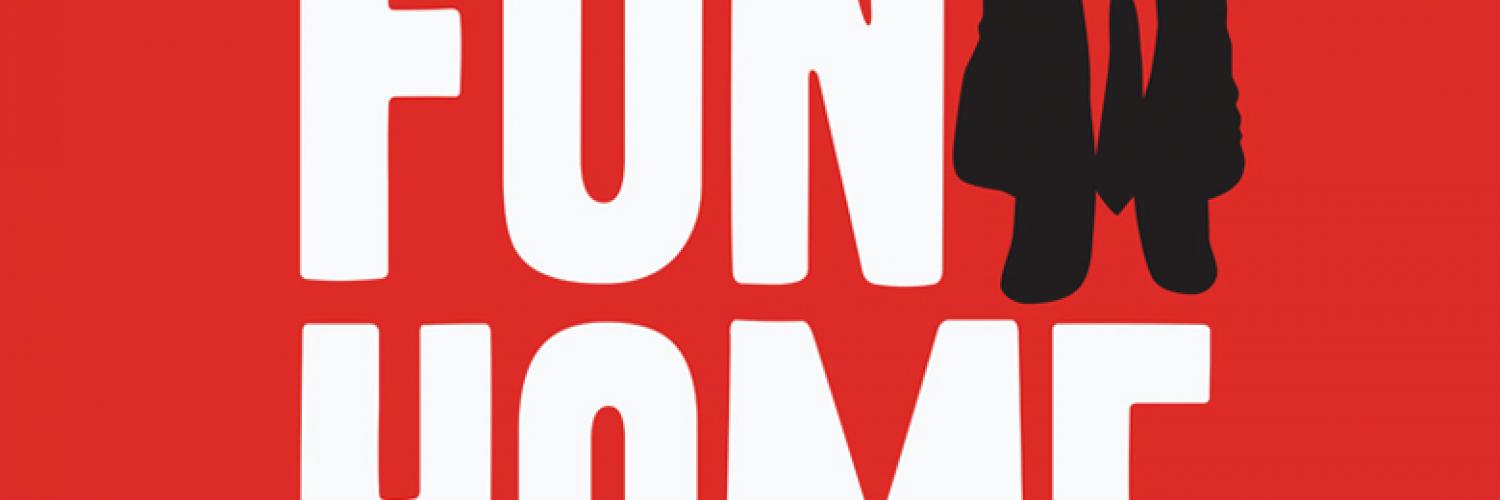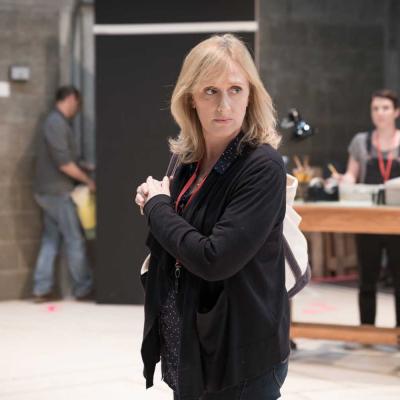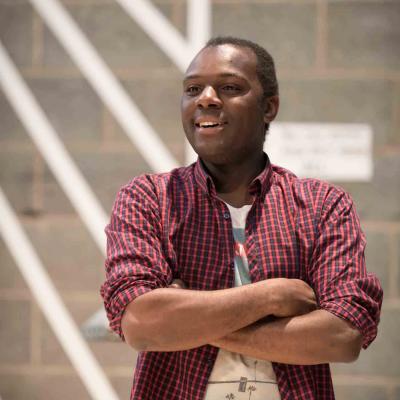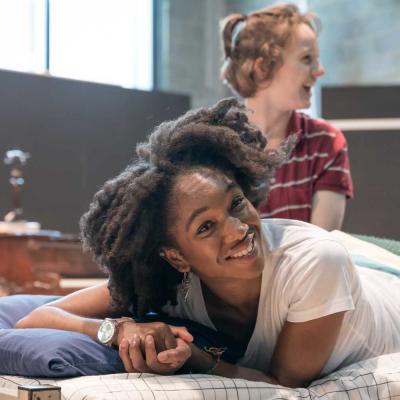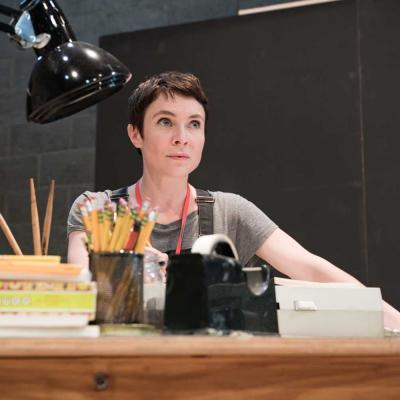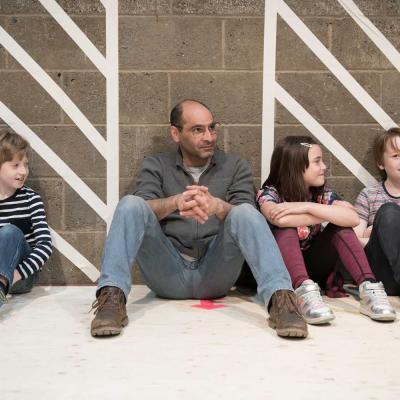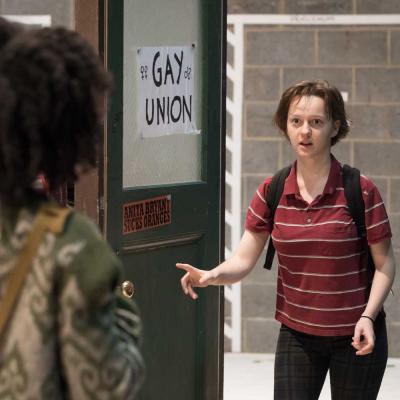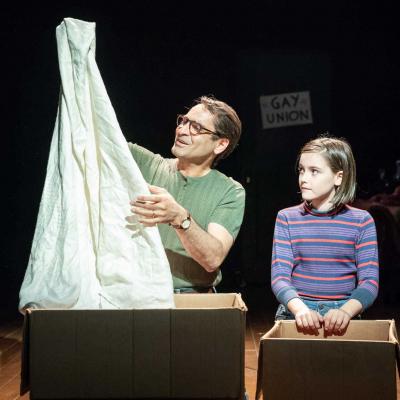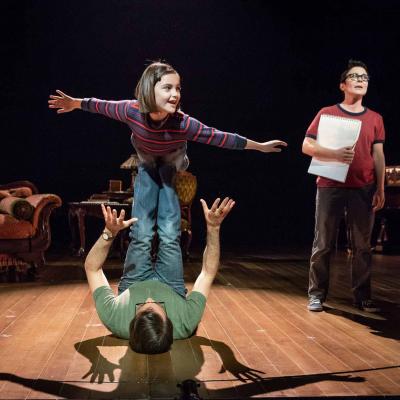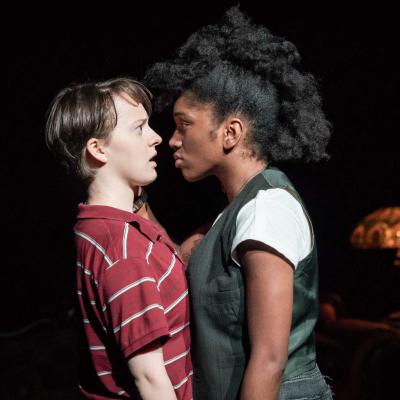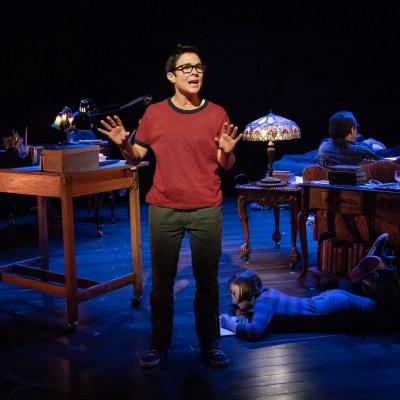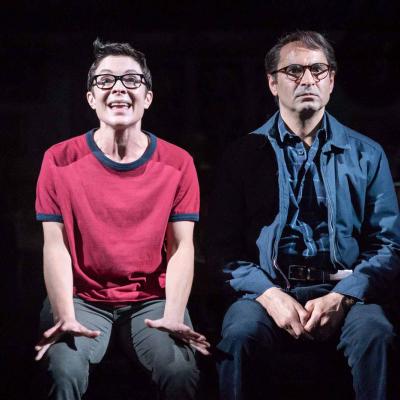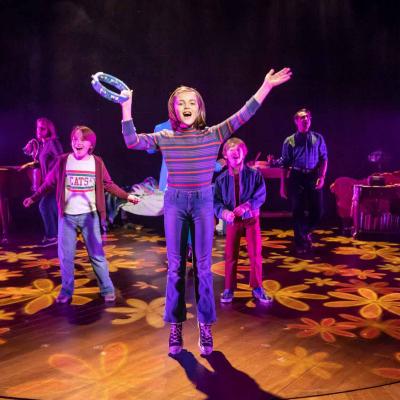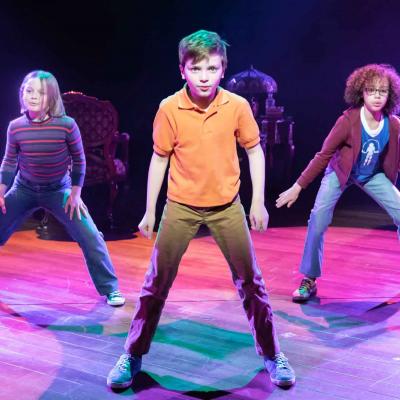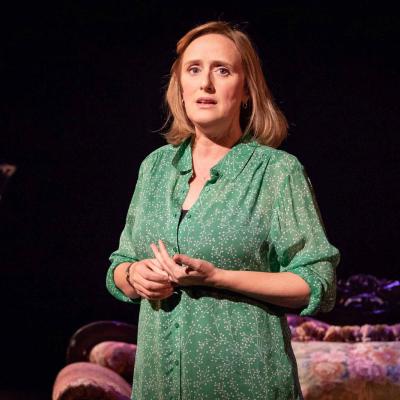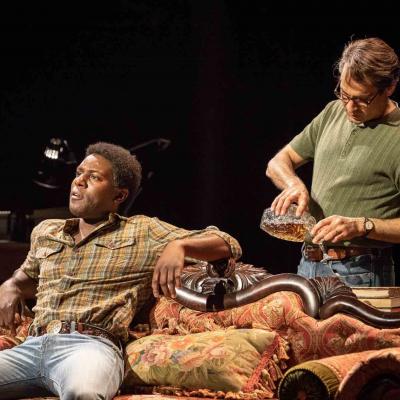Inside Fun Home
Inside Fun Home takes you behind the scenes to give you an insight into how the production came to life. From the original idea and the people behind the script to the creatives and production teams who do amazing work to put the production on our stage, Inside Fun Home explores how different elements come together to form what you experience at the Young Vic.
Watch the build of our Fun Home on Maple Avenue
Introduction to Graphic Novels
A graphic novel can be lots of things. It can be autobiographical, as is the case with Alison Bechdel’s Fun Home, it can be a piece of journalistic insight, such as Joe Sacco’s Palestine or The Fixer, an account of the Bosnian war. It could be part of a cannon, such any given book within the child-friendly The Adventures of Tintin or Asterix series, or it can be a standalone piece of high-art, such as Art Spiegelman’s Maus, a vivid retelling of his own father’s experiences of the Holocaust, with mice representing Jews, and cats for Germans.
What a graphic novel is not, is just a simple comic. The sheer variety of stories told, and the methods and aesthetic style in which these stories are told, make it one of the broadest genres in all of literature. The use of images and drawings helps to guide and focus the reader’s imagination, in a way that other novels possibly don’t; we see worlds and places and times framed through the eyes of the author and/or illustrator, we can choose to picture ourselves immersed in these worlds, or simply be voyeurs looking in. Obviously, this can also be the case with any works of literature or indeed non-fiction, but the use of image and drawing helps to provide authenticity and credibility to the stories presented. Herge, author and artist of the Tintin books, was meticulous with his accuracy at all times, when drawing cars or famous buildings or the fashion of the day, and the same can be seen in Bechdel’s recreation of the house that her father so lovingly curated.
Graphic novels can open up new worlds, both fantasy and the real, both historical and contemporary, in a hugely accessible and engaging format. These are brilliant stories, and also brilliant works of art.
Some recommended reading:
- Fun Home by Alison Bechdel
- Are You My Mother by Alison Bechdel
- Maus by Art Spiegelman
- Palestine by Joe Sacco
- The Fixer by Joe Sacco
- The Adventures of Tintin by Herge
- The Asterix series by Rene Goscinny and Albert Uderzo
- Watchmen by Alan Moore and Dave Gibbons
- Ghost World by Daniel Clowes
- Persepolis by Marjane Satrapi
Alison Bechdel in conversation with Sofie Hagen
Rehearsal Diary: Lucy J Skilbeck
Lucy J Skilbeck is the Jerwood Assistant Director on Fun Home. As part of their role in the production they keep a diary of some of the key moments which happen throughout rehearsals. Lucy kindly shared an excerpt from their diary about the first day of rehearsals.
Great day today.
This morning I continued to make a key for the script and the graphic novel. For each page of the script we now have a log of all the pages in the novel the script is referencing, this might be up to twenty pages as the narrative is not linear, it twists and turns and repeats.
We’ve been thinking about the relationship between the text and the music. The music is pushing one way and the text another, and where they meet and press against each other is where the scenes come alive. The music is pushing towards a tragedy and moving us forward, but the characters don’t know that, they can only be in the present, we can’t play the end at the beginning.
I’m working a lot with the young company, they are a lot of fun with endless energy and enthusiasm. Tomorrow we will run through the whole show. We are working fast, sketching as a whole, building the show. The structure of the show dictates that we work like this. Alison is forging ahead, remembering and questioning and as such the scenes are interwoven, people come and go, you have to get into the show and ride it. Our characters are so close physically and so far away emotionally. There are scenes where we watch and think - this should have gone differently - these people could have made a different call - but they don’t. And they have a short scene and then the music changes and it’s too late - we are taken elsewhere.
Meet the cast of Fun Home
Alison Bechdel explores her on stage desk
Day in the life of a Stage Manager
Ben Delfont, our Fun Home Stage Manager wrote up what his 'normal' day tends to involve whilst looking after Sam Gold's production at the Young Vic.
30 mins before rehearsals - come in and set up for whatever scene you’re starting with. Check in with the creative team with any questions you have for them, check that they’re happy.
Rehearsals involve many things, but some of them on Fun Home were - working out the scene changes, letting actors play around and discover how they want to do things, and supporting that, allowing them freedom to experiment, and trying to work out how to practically achieve what the actors and creative team want to happen. Also, you’ll be in and out of rehearsals all day, meeting with production management, lighting, sound, props, costume etc, to make sure everything you need for rehearsals is in place. You also tend to be the main liaison for the producers to know how it’s all going in rehearsals, as some directors like to keep a very closed and private rehearsal space, and you need to let the producers know how it’s all going, and whether there’s anything they should know.
Generally, rehearsals are 10am-6pm Monday to Friday, and sometimes on a Saturday too. It’s odd, as when you get onto what we call “show call” your hours go the complete opposite, usually 5pm-10.30pm Monday-Saturday, with a few matinees for good measure.
Then at the end of the day, you’ll work out the call for the next day with the director and creative team, trying to dovetail in the things you need to achieve (costume fittings/fight calls/dialect calls/press interviews etc) - depending on the show, this can either be very tricky or remarkably easy - it really varies from show to show.
You’ll also write (in collaboration with the DSM (Deputy Stage Manager) rehearsal notes, so you can ask any questions that have come out of rehearsals, and keep all departments in the loop about everything.
Production Roles
We've listed each type of production team member involved in making Fun Home happen every night to give you a better idea of the different types of people all working together as well as an insight into the variety of jobs a career in theatre production has to offer.
Stage Manager The Stage Manager has overall responsibility for stage management and the smooth running of the production. They need a general understanding of all aspects of production and offer organisational support to ensure the show runs smoothly and efficiently.
Deputy Stage Manager The DSM 'calls' the lighting, sound, flys, any scenic elements. 'Calling' means communicating with the rest of the show production team during a live performance when light, sound or scenic elements need to change. This is done via an intercom system linked to all the show operators and stage management team.
Assistant Stage Manager We have two ASMs on Fun Home. They look after the props backstage, oversee scene changes and ensure the actors are safe and well.
Lighting operator The lighting operator is responsible for checking that all lighting equipment is working on a day to day basis, and fixing any problems (e.g. broken bulbs!). They are also responsible for making lighting cues happen at the right time during the show, as ‘called' by the deputy stage manager.
Sound No.1 (operator) ‘Mixes’ the show at the Sound Desk each night. This means they control the volume of all the band elements and all the microphones to make it sound even and natural and to make sure each element can be heard, they also trigger any sound effects. Responsible for all the technical elements of the sound system, they check every individual speaker and microphone for each performance.
Sound No.2 (operator) In charge of the on stage sound elements, primarily the radio mics on the actors. They fit miniature microphones into the hairlines of the actors and monitor and maintain them during the performance. They also look after any practical sound elements on stage. For Fun Home this includes the Piano, which is sometimes a real paino and sometimes a dummy with a speaker in that the actor mimes to, and the TV which is not actually a real 70’s TV but a mini computer and a flat screen TV.
Followspot operator We have three followspot operators on ‘Fun Home’ who ensure individual performers are lit during specific moments of the show, and are used in addition to lighting cues to create atmosphere and mood. This role involves manually moving a light in order to ‘follow’ the performer around the stage.
Automation operator Operating the revolve and coffin and the big wall that flies in - also the mirrorball and chandelier.
Wardrobe Manager Assists with the actors’ quick changes during the show and carries out costume maintenance.
Wig dresser Assists with fitting actors’ wigs during the show. On Fun Home, Zubin who plays Bruce and Ashley who plays Roy both wear wigs. Also carries out wigs maintenance.
Stage Crew Assists with scene changes by moving scenery, furniture and props.
Jeanine Tesori, Lisa Kron and Sam Gold in conversation with David Lan
David: How did it start?
Lisa: Someone proposed to me that Alison’s book could be a musical. I thought that seemed like a good idea, although I’d never written a musical before so I could just as easily have been wrong.
Jeanine: Lisa called me and I thought: ‘This is a fantastic idea.’ I don’t consider myself a songwriter as such, that’s why I love working with great playwrights.
Sam: The two of them started with a very scary blank page because the book is not linear, there’s no protagonist, there’s no action, it has almost no scenes.
Jeanine: What I was interested in, and Sam encouraged us in this, wasn’t putting the book on stage, it was telling the story of how we continue to reach for our parents at every age.
Lisa: Writing Fun Home was relentlessly difficult. Usually, at some point you crack it and then you can just make the thing. In this case it was very late that that happened. It was all trial and error all the time.
Sam: For me, it started out like: ‘I love this book, I’m a huge fan of this project and I’m really interested in how you’re going to figure it out, good luck.’
David: What was so hard about it?
Jeanine: What’s hard about musicals is that they don’t shape out for a really long time. Some people are lucky and they get there on the first swing. I’m not one of those writers. It takes me a while to figure out what to bring to the stage, what I’m in love with versus what the piece needs.
Lisa: The character of Alison in the book, you know: she remembers, she thinks, she draws. None of those things can be seen on a stage, so the interesting question for me was: How do you make a drama out of that?
Jeanine: And it’s about a real person, it’s the history of an actual family for whom the stakes are high, so I felt a responsibility to be a faithful to what’s authentic about the book and still bring my own voice to it, not to varnish the impulses that Alison had but to illuminate them and deepen them.
Lisa: We were lucky with timing in terms of where the culture was at that point, the cultural scaffolding that enabled people to meet it.
Jeanine: The Sunday in June that the US Supreme Court passed the gay marriage law Fun Home was playing. It was such an astonishing thing: this musical was reflecting the time we live in. because musicals take a long time to write, it was unbelievable the way it hit the moment.
Sam: I’ve never worked on a show before where I watch audience members have life changing experiences. The combination of what Alison channeled and the way Lisa and Jeanine tell her story is giving a lot of people a context for exploring things in their own lives that are hard to explore otherwise.
Jeanine: Alison calls her book Tragicomic. I think that’s exactly what this musical is. It behaves like a play and emotes like a musical.
Sam: Here’s the thing that sticks with me now. You know, 5 years ago it was: ‘How do I stage a graphic novel?’ Now it’s: ‘How do I make work where someone needs that piece of work for something important in their life?’
Lisa: I come from a place where there is no reason to do the work except for the joy and the interest of seeing what we could make together. It was a great alignment of stars.
Get in touch
These inside guides are an evolution of the traditional educational resource pack, providing schools with more interactive content and wider audiences with an insight into the creation of our productions. We always welcome questions and feedback, just email schools@youngvic.org
